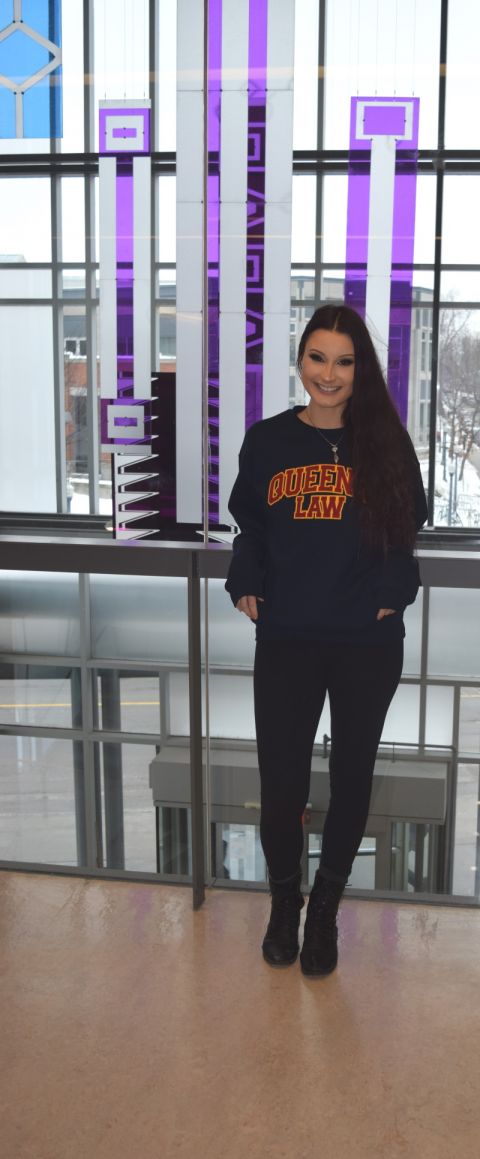
A second-year Queen’s Law student has earned an unprecedented distinction that in the words of Ann Deer, the Faculty’s Indigenous Recruitment and Support Coordinator, has spotlighted her going forward as “a student to watch.”
Rachel Hay, Law’21, is one of the youngest people ever to receive an invitation to be a featured panel speaker at a Law and Society Association (LSA) conference. The 56th iteration of that annual event will be held in Denver, Colorado, May 28-31.
Hay, a 28-year-old resident of Tyendinaga Mohawk Territory, 60 kilometres west of Kingston, will present a 35-page research paper that she wrote in the autumn term for a Law & Injustice course taught by Professor Ashwini Vasanthakumar.
“I use Canada’s notorious historical and institutional injustices, a liberal theory of justice, as well as Canadian common law, to argue that this country has a moral, liberal and legal responsibility to acknowledge Indigenous sovereignty as an inherent right belonging to First Nations, Inuit, and Métis communities,” Hay explains.
“In my review of Canada’s historical and institutional injustices, I explain that these have been implemented by Britain and Canada strategically and systemically. I argue that this really amounts to a form of genocide. Then, by using arguments under sections 25 and 35 of the Constitution (Existing Aboriginal and Treaty Rights) that commit Canada to recognizing and supporting sovereign-nations status for First Nations and Métis peoples, I try to put the Canadian government into a corner and force it to do the right thing.”
LSA conference organizers clearly were impressed by the quality of Hay’s scholarship, by the precision of the arguments she presents, and by the fact she framed her argument in such a way that it can be applied both in Canada and globally.
That latter point is especially relevant to the LSA, which is a prestigious interdisciplinary scholarly organization that’s committed to social scientific, interpretive, and historical analyses of law across multiple social contexts.
“When I first visited the LSA website and saw that it works to make the world a better place using the law on behalf of marginalized groups, I was excited,” says Hay. That’s exactly what I’m interested in doing.”
She grew up in a family in which the law, social justice, and the fight for First Nations rights are top of mind. Both her mother and her father, who’s a retired RCMP officer and the former chief on the Tyendinaga police force, are activists. “I am, too,” says Hay.
She knew she faced long odds when she submitted her paper for consideration in the LSA’s “Junior Scholars potential panel-speakers” category. But Hay was undaunted, and her initiative has paid off.
“The LSA has a mentoring program but even then, the largest number of those students presenting from JD programs either already have graduate degrees from prior educational programs, or tend to be in Law 3,” says Professor Kathleen Lahey, who is non-arms length co-director of the LSA-affiliated International Socio-Legal Feminisms Collaborative Research network. Hay’s paper was assigned to Lahey because of its international and Indigenous focus. “At first, I didn’t notice who wrote it,” she says, “but after reviewing and accepting the proposal for presentation in Denver, I went back and realized that it was our own Rachel Hay!”
While she was surprised and delighted to have received her invitation take part in the 2020 LSA conference, Hay has a mission firmly in mind for when she travels west to Denver, a city she’s keen to visit for the first time. “First and foremost, I hope people at the conference will think about the points I’ll be making in my arguments,” she says.
“Colonial governments in Canada and elsewhere really don’t have a choice when it comes to recognizing and supporting Indigenous sovereignty. In my view, it’s impossible and unviable for colonial countries to continue to ignore and reject Indigenous rights to sovereignty.”
By Ken Cuthbertson, Law'83